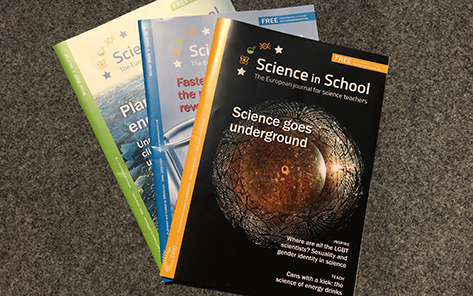The challenges of science teaching Inspire article
What do you find the biggest challenges in science teaching? Can Science in School help?
Which science topics do you find hardest to teach your students? And why? Is it difficult to get hold of good background information – particularly about recent developments in science – or is the topic simply tricky to communicate? These were questions I posed teachers from across Europe during a workshop at the eTwinning conference in Athens, Greece. The answers were varied and, for me as the editor-in-chief of Science in School, enlightening. In some cases, we have articles that could help to make the life of those busy teachers a little easier. In other cases, the participating teachers gave me ideas for future articles.

Hayes
Keeping up with cutting-edge science
Science is fast moving. For one biology teacher, the biochemistry and molecular biology are particularly hard to keep up with. Textbooks can’t provide cutting-edge information and access to research journals is expensive. Hosted at the European Molecular Biology Laboratory (EMBL), however, Science in School has direct access to research scientists in the field and can thus offer a wealth of suitable articles. Why not introduce your students to CRISPR, the new and controversial gene-editing technology? Or try a hands-on activity to simulate a DNA microarray in the classroom? You could consider the place of systems biology in the classroom, learn how one evolutionary biologist excavates the human genome, or simply browse the full collection of EMBL-related articles.
Biology teachers also reported that recent research on photosynthesis was hard to get hold of. We haven’t yet had any articles on photosynthesis research, but we might have before long. In the meantime, your students could investigate the importance of chlorophyll using variegated plants, test the effectiveness of different plant pigments in photosynthesis, or consider the fate of an Earth without trees. Primary-school teachers, who – like one of the workshop participants – struggle to get across the excitement of plants, might find these hands-on activities, to investigate oxygen consumption and conservation, just what they need.
Making lessons memorable and meaningful
One science teacher explained the troubles he has, integrating mathematics meaningfully into his lessons – although the applications of mathematics are legion, as Professor Marcus du Sautoy explains. Maths can help us understand, predict and tackle epidemics, understand the chemistry of crystals, or evaluate the effectiveness of a medical treatment.
To give your students some first-hand experience of the applications of mathematics, why not try modelling climate change, building a rocket, or measuring the explosiveness of a volcano. Apply maths to the heavens and investigating sunspots, measure our distance from the Moon or the stars, or calculate the circumference of Earth.
A challenge for two chemistry teachers was introducing atoms, molecules and ions in an engaging and memorable way. We don’t have any articles specifically on this, but perhaps we should. How do you explain these concepts to your students? Do you use games, role plays or models to help you? Why not email us and explain – we could share your ideas in Science in School.
Choosing the best tools
Sometimes the predicament is not too little information or too few teaching materials but the very opposite. One physics teacher was keen to use information and communications technology (ICT) tools and web experiments but found himself overwhelmed by the wealth of possibilities: which tools should he use and how should he integrate them effectively into his lessons? Which web experiments have you used in your physics lessons and how? Or have you used ICT tools in other science lessons? Why not write a review of your favourite resource and submit it to Science in School?
New ideas for non-specialists
The primary teachers in the workshop were especially vocal, discussing the challenges they face with their colleagues and sharing helpful materials and ideas. Particularly for primary-school teachers without a science background, it is no easy task to provide engaging, hands-on and informative science lessons. For some new ideas, you might like to use storytelling to introduce your experiments, take your pupils on a journey back to the Stone Age, combine science with art, by making and using your own pH-sensitive inks, do some creative – and scientific – writing or challenge your students to predict what will happen next. Alternatively, you can search the Science in School website for teaching materials on specific subjects and specify the age of your pupils.
Other particular challenges at primary school included measurements and units, map reading, and electricity. How do you teach these topics at primary school? Which materials – whether in Science in School or elsewhere – do you find helpful? What tips would you give your colleagues?
Finally, which topics do you, our readers, find challenging to teach? Have you used our articles to help you? And which topics would you like us to cover in future issues of Science in School?





